Pregnancy
All information about "Pregnancy" and the related magazine articles can be found here.
Our articles are written clearly and link to scientific studies where relevant. This is how we meet our own standards: we regularly deliver new, high-quality content for you—free of charge, no sign-up required, with the highest possible benefit to you.

Support for Picky Eaters
When children's picky eating behavior endangers the nutrient supply
Does your child consistently refuse vegetables and only accepts a handful of foods? Here you can find out what is behind the so-called “picky eater syndrome”, why vitamin C is so essential for children's development and which tricks help to defuse picky eating behavior without pressure.
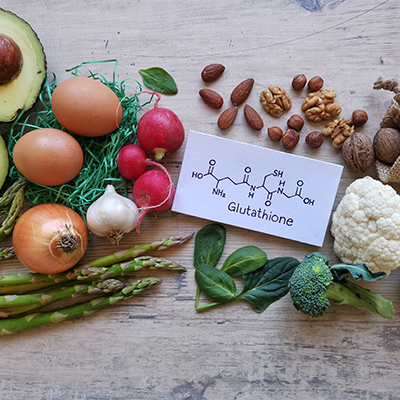
Liver detox with L-glutathione: fresh energy for spring!
Gentle detoxification instead of a crash cure - how L-glutathione supports the liver
The liver filters toxins out of the body and optimally utilizes nutrients. But how can you strengthen it naturally without going on extreme detox cures? Discover here what glutathione has to do with the liver and which simple home remedies can help with “spring cleaning” from the inside.

Winter cabbage & iron: Powerful nutrients for the cold season
Find out how winter cabbage, vitamin C and iron-rich foods support your health and provide your body with optimum care.
Winter cabbage provides valuable iron, which is absorbed even better with vitamin C. Discover delicious recipes and nutrition tips to keep you fit and full of energy throughout the winter!

Protection for your mucous membranes with vitamin B3 (niacin)
Cold air outside, dry heating air inside - this can put a strain on mucous membranes
Find out how micronutrients such as niacin (vitamin B3) can help to support the natural barrier function of the mucous membranes and effectively counteract dryness. An adequate supply of vitamin B3 can help to maintain the well-being of your skin and mucous membranes during the cold season.

Sleeping problems in winter? How magnesium supports your sleep!
How magnesium can contribute to a relaxed night
Winter not only brings cold temperatures, but often also restless nights. Many people toss and turn in bed, struggle with muscle tension or wake up tired in the morning despite getting enough sleep. Magnesium is an essential nutrient that plays a role in muscle relaxation and the sleep-wake rhythm. In this article, you will find out which magnesium supplements are suitable for the evening hours and how you can promote a restful night's sleep with simple routines.

More energy in winter: Ashwagandha as natural support
How the adaptogen can help alleviate the winter blues.
The dark season can not only dampen your mood, but also cause persistent tiredness and listlessness. When energy is lacking and exhaustion remains even after a good night's sleep, the right support for body and mind may be lacking. Ashwagandha is a traditional adaptogen that can help promote inner calm and stabilize the sleep-wake cycle. Find out how you can support your well-being in winter with simple measures and a targeted supply of nutrients.

Constant tiredness despite sleep? How vitamin B complex gives you new energy
More energy, better concentration and less fatigue - this is how B vitamins support your body in winter.
Do you know the feeling of waking up completely exhausted in the morning, even though you've actually had enough sleep? Winter fatigue often robs us of energy, especially in the darker months of the year. The good news is that your body can do more than you think - it just needs the right stimuli! Find out how a vitamin B complex can help you reduce fatigue, boost concentration and get through the winter with more energy. Read now how you can specifically support your energy metabolism!

Strengthen your family with a vitamin boost in winter
Little sunlight, fluctuating temperatures and waves of colds challenge the immune system. Find out how you can get through the cold season healthy and full of energy with vitamin C!
Find out which symptoms indicate a vitamin C deficiency, which foods are real vitamin C bombs and how you can easily integrate your daily intake into your everyday life. Whether for parents, children or older people - with the right nutrients, the whole family can stay strong!

Frankincense: the versatile resin of nature
Discover the history, applications and valuable ingredients of this traditional natural wonder.
Frankincense has inspired people for thousands of years with its fragrance and versatile applications. Whether in ceremonies or as a potential remedy - find out what makes this special resin so unique.

Hashimoto's thyroiditis: Understand, recognize, treat
Find out all about the causes, symptoms and possible treatment approaches for the most common thyroid disease.
Hashimoto's thyroiditis is the most common autoimmune disease of the thyroid gland. Find out how the disease develops, what symptoms can occur and what treatment options are available.
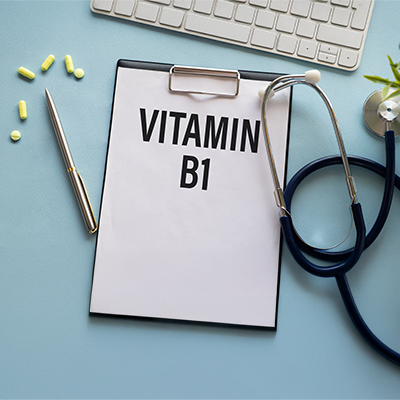
Beriberi: the underestimated consequence of a vitamin B1 deficiency
Find out how beriberi disease manifests itself, what causes it and how you can prevent a thiamine deficiency.
Beriberi is caused by a lack of vitamin B1 (thiamine) and can have serious consequences for the body. Read about the symptoms, how the disease is treated and how you can prevent it.
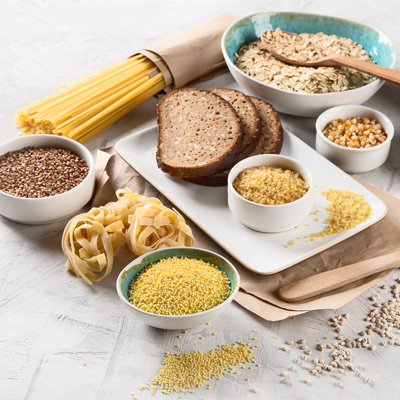
Polysaccharides: The invisible powerhouses for your diet
Find out how these complex carbohydrates support your health and what benefits they can offer the body.
Polysaccharides are complex carbohydrates that are found in many foods. Discover what role these polysaccharides play in our diet and what functions they fulfill in the body.

Glucosamine: a natural building block for your joints
Find out how glucosamine can help maintain joint structure.
Glucosamine is a natural component of our body and plays a central role in joint health. In this article, you will learn how it can support your joints and what you should keep in mind when taking it.

The cardiovascular system: your engine for health and energy
Discover how your cardiovascular system ensures that nutrients and oxygen reach every cell every day – and why it is so important to keep it healthy.
The cardiovascular system is our body's vital transportation system. It delivers oxygen and nutrients to every cell, keeping us moving every day. Learn how it works and why keeping it healthy is so important.

Micronutrients: small building blocks – big impact on your health
Find out how essential micronutrients can support your body and why they are indispensable, especially in times of stress and an unbalanced diet.
In today's hectic world, a balanced diet and vital substances often take a back seat. However, micronutrients – such as vitamins, minerals and trace elements – are essential for your health. Find out how these little helpers have a big impact and why they are indispensable in your everyday life.

Inflammation in the body: a protective mechanism with risks
Find out how inflammation protects the body and when it can become a health risk. Discover tips for helping your body to deal with inflammation.
Inflammation is the body's natural response to harmful influences. It protects us, but it can also become chronic and pose a health risk. Learn more about the balance between protection and risk and how you can help your body stay healthy.

Hyperthyroidism: When the body gets out of balance
Discover the signs of an overactive thyroid and learn how it can affect physical and emotional balance.
An overactive thyroid can throw many bodily processes out of whack, causing everything from constant restlessness to severe mood swings. Learn how to recognize the signs of an overactive thyroid and the steps you can take to get it under control.
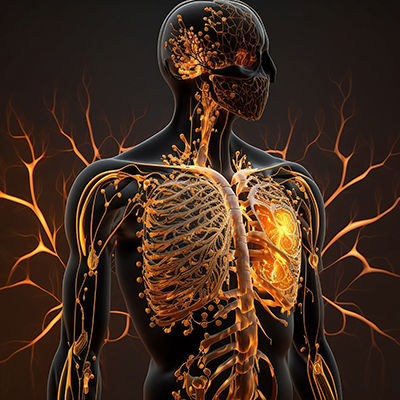
Mysterious autoimmune disorders
When the immune system gets out of control.
Find out what happens when the immune system suddenly attacks the body's own cells, what diseases there are and what symptoms you should take seriously in order to be able to act early.

Citrulline – the natural energy booster
Find out how citrulline can help support your performance and endurance in everyday life.
Citrulline can support your energy and endurance, promote recovery and improve blood flow. Discover how this amino acid derivative can help you in your daily life.
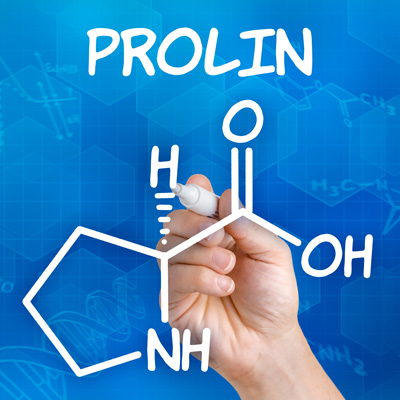
Proline: the building block for healthy joints
Discover the benefits of proline for your joints, skin and connective tissue.
Proline is an amino acid that plays an important role in healthy joints, skin and connective tissue. Find out how proline can help strengthen your joints and keep your skin elastic. Immerse yourself in the world of amino acids and their benefits for your health!

Fibromyalgia: living with chronic pain
Understand, relieve and live better - your source of knowledge and support for fibromyalgia.
Fibromyalgia affects millions of people worldwide and causes chronic pain, fatigue and sleep disorders. Find out what treatment options are available to alleviate symptoms and improve quality of life. Discover tips and strategies for a better well-being.
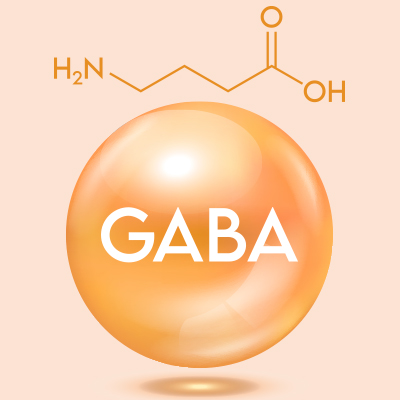
Say goodbye to stress - hello GABA!
Do you often feel stressed and overworked? GABA, a natural neurotransmitter, could be the solution. Find out how GABA helps your body to reduce stress, calm your nerves and promote a feeling of deep relaxation.
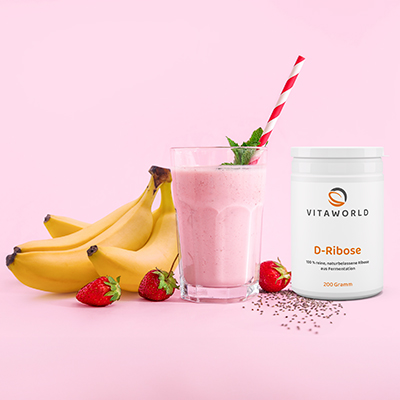
D-Ribose Power-Smoothie
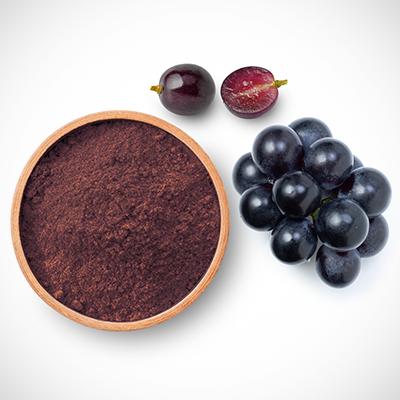
OPC - antioxidants for better health!
Why OPC can fight oxidative stress
Every day we fuel our health with negative influences, sometimes consciously, sometimes unconsciously. Find out here how oxidative stress damages our body and how oligomeric proanthocyanidins (OPC) can strengthen it.
Optimal Supply During Pregnancy: Tips and Advice for Expecting Mothers
Pregnancy is an incredible journey in a woman's life, marked by physical changes, emotions, and anticipation of the upcoming family member. From the first signs to the birth of the child and beyond, each phase is significant and brings a wealth of questions, hopes, and challenges. From the absence of menstruation and the first pregnancy test to the due date, exciting experiences await. Learn more about the various aspects of pregnancy and get well-founded information and useful advice to support expecting mothers on their journey.
How to Recognize Pregnancy?
The signs of being pregnant can vary from case to case. Typical early symptoms include the absence of menstruation, nausea, fatigue, more sensitive breasts, and increased urination. A pregnancy test can turn positive as soon as the body produces sufficient amounts of the pregnancy hormone hCG, which typically occurs about two weeks after conception. However, a pregnancy test can yield both false positive and false negative results. It is therefore recommended to consult a doctor as soon as possible after a positive pregnancy test or suspicion of pregnancy to confirm implantation and receive necessary medical care. An absent period should also be clarified regardless of the results of a pregnancy test. Some women may experience first signs of being pregnant just a few days after conception, while others may take a little longer to notice changes.
What Helps with Nausea During Pregnancy?
Pregnancy nausea is hormonally induced and often occurs from the fifth or sixth week of pregnancy, but can also occur earlier or later. There are various remedies and strategies that can provide relief from nausea. Some expectant mothers find relief through small, frequent meals (e.g., crispbread) that are rich in carbohydrates and low in fat. Ginger in the form of tea, candies, or capsules can also be useful in reducing nausea and vomiting (1).
Acupressure bracelets worn on the wrist can alleviate nausea in some women (1). It is important to consume enough fluids, especially in the form of clear drinks such as water or ginger tea. In case of severe or persistent symptoms, it is advisable to consult a doctor to discuss further treatment options.
Further useful information on the topic can be found here: /blog/where-does-pregnancy-nausea-come-from
Overview: What Happens in Each Week of Pregnancy?
Pregnancy lasts an average of 40 weeks, divided into three trimesters. The exact number of pregnancy weeks can vary as the time of conception is not always precisely known. To calculate the pregnancy week, the first day of the last menstruation is used as a starting point. There are numerous pregnancy week calculators and tables available to track progress.
Different developments occur in the body of the child and the pregnant woman during each pregnancy week. As the child develops rapidly, it is important for women who decide against having a child to make this decision promptly to consider all available options and, if necessary, take appropriate steps. Abortion is legal in many countries up to the 12th week of pregnancy, but legal regulations may vary depending on the country. It is important for women to receive all available information and support to make an informed decision.
Here is an overview of the pregnancy weeks and the corresponding changes (2):
1.-4. Week: Implantation of the fertilized egg, beginning of organ formation.
5.-8. Week: Developmental phase of organs and body systems, heartbeat of the embryo.
9.-12. Week: Completion of organ formation, formation of finger and toe rudiments.
13.-16. Week: Fetal growth, movements become noticeable, first ultrasound examinations.
17.-20. Week: Developmental phase of the skeletal system, determination of the baby's sex, first movements felt by the pregnant woman.
21.-24. Week: Further fetal growth, developmental phase of the brain.
25.-28. Week: Fetus begins to turn upright, opening and closing of the eyelids.
29.-32. Week: Baby's weight gain, developmental phase of the immune system.
33.-36. Week: Preparation for birth, baby descends into the pelvis.
37.-40. Week: Completion of organ development, baby is ready for birth.
It is important to note that the developmental stages of each baby are individual and may vary from case to case.
When Does the Belly Start to Grow?
The time when the belly starts to grow can vary and depends on various factors, including the woman's individual anatomy, the size of the baby, and whether the mother is pregnant for the first time or not. Typically, women, especially first-time mothers, begin to notice a slight increase in belly size towards the end of the first trimester (around the 12th to 16th week of pregnancy) as the uterus expands and the baby grows. In women who have been pregnant before, the belly may start to grow earlier, possibly around the 10th week of pregnancy or even earlier.
What Helps with Heartburn?
In addition to nausea and vomiting, heartburn is another symptom reported by many pregnant women. Various measures can help against heartburn, including (3):
Small Meals: Instead of large meals, frequent small meals can be consumed to avoid overloading the stomach.
Upright Posture After Eating: Remain upright for at least an hour after eating to prevent stomach contents from entering the esophagus.
Avoidance of Certain Foods: Spicy, fatty, and acidic foods as well as caffeinated beverages can exacerbate heartburn and should be avoided.
Sleeping with Elevated Upper Body: Sleeping with a slightly elevated upper body can help reduce heartburn.
Natural Remedies: Ginger, chamomile tea, or almonds can help alleviate heartburn.
Medication: In some cases, the doctor may recommend taking medication to bind stomach acid to relieve heartburn (3). However, it is important to consult a doctor to ensure the safety and appropriateness of medications during pregnancy.
If heartburn is severe or frequent, it is important to discuss this with a doctor to take appropriate countermeasures. More information on heartburn can be found here.
When Is the Critical Time Over?
The critical phase in pregnancy, also known as the first trimester, typically ends after the first 12 weeks or three months. Complications and miscarriages are more common during these months, especially in the first weeks. After the first trimester, the likelihood of miscarriage and pregnancy complications usually decreases significantly, and the fetus develops and grows in size. However, it is important to note that each pregnancy period is individual, and problems may also occur in later trimesters. It is therefore advisable to pay attention to the health and well-being of the mother throughout the months and to undergo regular check-ups from the absence of menstruation.
From When Is a Baby Viable Outside the Womb?
A baby is generally considered viable outside the womb from the 24th week of pregnancy, as at this stage the organs and systems of the fetus are sufficiently developed to survive outside the uterus, albeit with intensive medical support (4).
Premature births occurring before the 37th week of pregnancy, however, can be associated with a range of complications. These include respiratory problems due to lung immaturity, inability to regulate body temperature, difficulties in feeding and digestion, as well as an increased risk of infections and developmental delays (4).
The consequences of premature birth can range from mild to life-threatening problems, and the chances of survival and long-term health prospects depend on various factors such as the age of the child at birth, the quality of medical care, and individual health conditions.
What Is Pregnancy Poisoning?
Pregnancy poisoning, also known as preeclampsia, is a serious condition during pregnancy characterized by high blood pressure and protein in the urine after the 20th week of pregnancy, i.e., in the later months. The causes of this are not fully understood, but problems with the placenta and blood vessels play a role. Symptoms include high blood pressure, headaches, vision disturbances, nausea, abdominal pain, and water retention. Untreated, pregnancy poisoning can lead to eclampsia, liver or kidney failure, and even death (1). Treatment involves blood pressure control, monitoring, medication, and possibly termination of pregnancy. Early recognition of signs and symptoms as well as more frequent prenatal examinations in the weeks and months from the middle of the pregnancy period are important.
Why Can There Be Gestational Diabetes?
Gestational diabetes occurs in pregnant women when the body does not produce enough insulin to cope with the increased blood sugar level. Pregnancy hormones can impair insulin action, leading to elevated blood sugar levels. Risk factors include obesity, family history of diabetes, and previous cases of gestational diabetes. Untreated, it can lead to complications for both mother and child, such as an increased likelihood of cesarean section, preterm birth, and higher birth weight of the child (6).
Signs of gestational diabetes can include:
Frequent Urination: Frequent urination can be an initial symptom as the body eliminates excess sugar through urine.
Excessive Thirst: Increased fluid excretion can lead to increased thirst.
Fatigue: Gestational diabetes can cause fatigue as the body is unable to effectively use sugar to produce energy.
Vision Problems: Some women may notice vision problems as high blood sugar affects fluid balance in the eye.
Weight Gain: Unexplained weight gain despite a healthy diet and exercise may be a symptom of gestational diabetes.
Infections: Pregnant women with gestational diabetes may be prone to urinary tract infections or vaginal yeast infections.
Control measures include regular blood sugar monitoring, a balanced diet with a low glycemic index, regular physical activity, and in some cases insulin therapy. Early diagnosis and regular medical care are crucial to minimize the risk of complications.
Which Pregnancy Vitamins Are Beneficial?
Pregnancy vitamins play a crucial role in supporting the health of both mother and child during pregnancy. Here are some important vitamins (7):
Folic Acid (Folate): Supports the formation of the neural tube and can prevent neural tube defects such as spina bifida. The recommended intake is 400 micrograms per day.
Vitamin D: Important for bone formation and calcium absorption. It is recommended to take a vitamin D supplement of 10 micrograms per day.
Iron: Supports the formation of red blood cells and helps prevent iron deficiency anemia. The recommended intake is 30 milligrams per day.
Calcium: Important for bone formation and tooth development. The recommended intake is 1,000 milligrams per day.
Omega-3 Fatty Acids: Important for brain and eye development in the fetus. The recommended intake is 200-300 milligrams of DHA per day.
Iodine: Important for thyroid function and brain development in the fetus. The recommended intake is 220 micrograms per day.
Pregnant women should ideally obtain these vitamins through a balanced diet rich in fruits, vegetables, whole grains, lean proteins, and dairy products. In some cases, however, it may be necessary to supplement certain vitamins to meet the increased demand during pregnancy. It is important to consult a doctor or midwife before taking any supplements to ensure the appropriateness and dosage.
What Should You Eat During Pregnancy?
If you are pregnant, a balanced diet is crucial to support both the mother's health and the baby's development. It is recommended to consume a variety of nutrient-rich foods, including fruits, vegetables, whole grains, lean proteins such as lean meats, fish, legumes, nuts, and seeds. Dairy products also provide important sources of calcium.
In the early weeks of pregnancy, it is particularly important to ensure adequate intake of folic acid to reduce the risk of neural tube defects. Smaller, more frequent meals can help alleviate nausea. Drinking enough water is also important to keep the body hydrated and alleviate potential pregnancy discomfort.
What Should Pregnant Women Avoid Eating?
Pregnant women should avoid certain foods to reduce the likelihood of complications during pregnancy. These include:
- Raw or undercooked meat
- Raw fish
- Raw eggs and products containing raw eggs
- Raw milk and unpasteurized dairy products
- Soft cheeses such as Camembert, Brie, or Feta
- Raw sprouts
These products should be avoided as they can increase the risk of food poisoning from bacteria or parasites, salmonella infections, and toxoplasmosis.
Tt is also recommended to reduce consumption of highly caffeinated beverages and to completely avoid alcohol consumption during the months leading up to the due date and also during breastfeeding, as alcohol can increase the risk of birth defects and developmental disorders such as FASD (8).
Tips for the Postpartum Period!
The postpartum period, also known as the postpartum phase, is an important time of recovery for the mother after childbirth. Here are some useful tips:
Adequate Rest and Recovery: Prioritize adequate sleep and rest periods to recover from the efforts of childbirth and adjust to the new situation.
Seek Support: Accept help from your partner, family members, or friends to receive support in caring for the newborn, household chores, and other daily tasks.
Healthy Nutrition: Pay attention to a balanced diet rich in nutrients that provides you with energy for your own recovery and for caring for the baby. Drink enough water to stay hydrated.
Personal Care: Take time for regular personal care, including showers or relaxation rituals, to feel fresh and groomed.
Explore Your Emotions: The postpartum period can be accompanied by emotional highs and lows. Openly discuss your feelings and seek professional support if needed to cope with mood swings or emotional challenges.
Stay Connected: Maintain contact with friends and family members to receive social support and avoid feeling isolated.
Gentle Exercise: Start slowly with gentle exercise such as walks to promote circulation and gradually reactivate your body. However, avoid excessive exertion and listen to your body.
Breastfeeding: If you are breastfeeding, seek support from a lactation consultant or specialist in case of problems or uncertainties to establish a successful breastfeeding relationship.
Bonding with the Baby: Use this time to build a bond with your newborn by promoting skin-to-skin contact, cuddling, and quiet moments of interaction.
Regular Doctor Visits: Keep regular appointments with your doctor to monitor your recovery, ask questions, and, if necessary, receive medical support.
Sources
[2] https://www.netdoktor.de/schwangerschaft/schwangerschaftswochen/
[3] https://www.netdoktor.de/schwangerschaft/sodbrennen-in-der-schwangerschaft/
[4] https://www.frauenaerzte-im-netz.de/schwangerschaft-geburt/frueh-und-fehlgeburt/
[5] https://www.usz.ch/krankheit/schwangerschaftsvergiftung/
[6] https://flexikon.doccheck.com/de/Schwangerschaftsdiabetes
[7] https://www.tk.de/techniker/magazin/familie/schwangerschaft-vitamine-mineralstoffe-2009392?tkcm=ab
